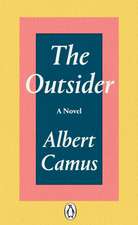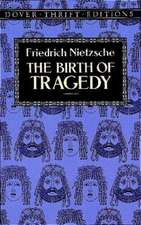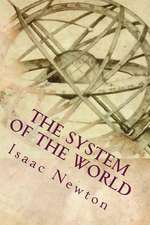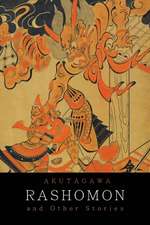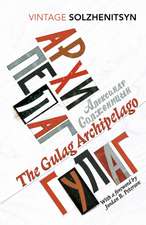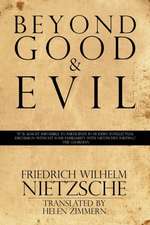Thus Spoke Zarathustra
Autor Friedrich Nietzscheen Limba Engleză Paperback – 27 noi 2017
| Toate formatele și edițiile | Preț | Express |
|---|---|---|
| Paperback (9) | 53.84 lei 21-33 zile | +20.25 lei 6-12 zile |
| Penguin Books – 27 feb 1974 | 53.84 lei 21-33 zile | +20.25 lei 6-12 zile |
| OUP OXFORD – 14 aug 2008 | 54.22 lei 10-17 zile | +20.85 lei 6-12 zile |
| – | 76.32 lei 3-5 săpt. | |
| – | 120.93 lei 3-5 săpt. | |
| Henricus - Edition Deutsche Klassik GmbH, Berlin – 4 mar 2015 | 181.08 lei 3-5 săpt. | |
| Lulu.Com – 27 noi 2017 | 122.36 lei 6-8 săpt. | |
| Lulu.Com – 11 aug 2020 | 122.46 lei 6-8 săpt. | |
| Simon & Brown – 20 noi 2018 | 212.97 lei 38-45 zile | |
| Simon & Brown – 5 mar 2012 | 220.12 lei 38-45 zile | |
| Hardback (8) | 119.84 lei 3-5 săpt. | +22.54 lei 6-12 zile |
| KUPERARD (BRAVO LTD) – 16 ian 2000 | 119.84 lei 3-5 săpt. | +22.54 lei 6-12 zile |
| Henricus - Edition Deutsche Klassik GmbH, Berlin – 4 mar 2015 | 341.24 lei 3-5 săpt. | |
| Lulu.Com – 11 aug 2020 | 204.53 lei 6-8 săpt. | |
| Blurb – 31 mai 2019 | 213.09 lei 38-45 zile | |
| Simon & Brown – 20 noi 2018 | 260.39 lei 38-45 zile | |
| Simon & Brown – 5 mar 2012 | 271.37 lei 38-45 zile | |
| Simon & Brown – 13 oct 2011 | 275.88 lei 38-45 zile | |
| Simon & Brown – mar 2012 | 277.75 lei 38-45 zile |
Preț: 122.36 lei
Nou
Puncte Express: 184
Preț estimativ în valută:
23.43€ • 24.40$ • 19.44£
23.43€ • 24.40$ • 19.44£
Carte tipărită la comandă
Livrare economică 14-28 februarie
Preluare comenzi: 021 569.72.76
Specificații
ISBN-13: 9781387401475
ISBN-10: 1387401475
Pagini: 196
Dimensiuni: 152 x 229 x 11 mm
Greutate: 0.29 kg
Editura: Lulu.Com
ISBN-10: 1387401475
Pagini: 196
Dimensiuni: 152 x 229 x 11 mm
Greutate: 0.29 kg
Editura: Lulu.Com
Notă biografică
German philosopher and philologist, Friedrich Nietzsche, was one of the most influential thinkers of our time. His works include critical texts on philosophy, science, cultural norms, religion and morality. His aim was the "truth" as he saw it, no matter how unpalatable, penned in a style characterised by metaphor and aphorism.
Cuprins
Thus Spoke Zarathustra Introduction
Part One
Zarathustra's Prologue
Zarathustra's Discourses:
Of the Three Metamorphoses
Of the Chairs of Virtue
Of the Afterworldsmen
Of the Despisers of the Body
Of Joys and Passions
Of the Pale Criminal
Of Reading and Writing
Of the Tree on the Mountainside
Of the Preachers of Death
Of War and Warriors
Of the New Idol
Of the Flies of the Market-Place
Of Chastity
Of the Friend
Of the Thousand and One Goals
Of Love of One's Neighbour
Of the Way of the Creator
Of Old and Young Women
Of the Adder's Bite
Of Marriage and Children
Of Voluntary Death
Of the Bestowing Virtue
Part Two
The Child with the Mirror
On the Blissful Islands
Of the Compassionate
Of the Priests
Of the Virtuous
Of the Rabble
Of the Tarantulas
Of the Famous Philsophers
The Night Song
The Dance Song
The Funeral Song
Of Self-Overcoming
Of the Sublime Men
Of the Land of Culture
Of Immaculate Perception
Of Scholars
Of Poets
Of Great Events
The Prophet
Of Redemption
Of Manly Prudence
The Stillest Hour
Part Three
The Wanderer
Of the Vision and the Riddle
Of Involuntary Bliss
Before Sunrise
Of the Virtue That Makes Small
On the Mount of Olives
Of Passing By
Of the Apostates
The Home-Coming
Of the Three Evil Things
Of the Spirit of Gravity
Of Old and New Law-Tables
The Convalescent
Of the Great Longing
The Second Dance Song
The Seven Seals (or: The Song of Yes and Amen)
Part Four
The Honey Offering
The Cry of Distress
Conversation with the Kings
The Leech
The Sorcerer
Retired from Service
The Ugliest Man
The Voluntary Beggar
The Shadow
At Noontide
The Greeting
The Last Supper
Of the Higher Man
The Song of Melancholy
Of Science
Among the Daughters of the Desert
The Awakening
The Ass Festival
The Intoxicated Song
The Sign
Notes
Part One
Zarathustra's Prologue
Zarathustra's Discourses:
Of the Three Metamorphoses
Of the Chairs of Virtue
Of the Afterworldsmen
Of the Despisers of the Body
Of Joys and Passions
Of the Pale Criminal
Of Reading and Writing
Of the Tree on the Mountainside
Of the Preachers of Death
Of War and Warriors
Of the New Idol
Of the Flies of the Market-Place
Of Chastity
Of the Friend
Of the Thousand and One Goals
Of Love of One's Neighbour
Of the Way of the Creator
Of Old and Young Women
Of the Adder's Bite
Of Marriage and Children
Of Voluntary Death
Of the Bestowing Virtue
Part Two
The Child with the Mirror
On the Blissful Islands
Of the Compassionate
Of the Priests
Of the Virtuous
Of the Rabble
Of the Tarantulas
Of the Famous Philsophers
The Night Song
The Dance Song
The Funeral Song
Of Self-Overcoming
Of the Sublime Men
Of the Land of Culture
Of Immaculate Perception
Of Scholars
Of Poets
Of Great Events
The Prophet
Of Redemption
Of Manly Prudence
The Stillest Hour
Part Three
The Wanderer
Of the Vision and the Riddle
Of Involuntary Bliss
Before Sunrise
Of the Virtue That Makes Small
On the Mount of Olives
Of Passing By
Of the Apostates
The Home-Coming
Of the Three Evil Things
Of the Spirit of Gravity
Of Old and New Law-Tables
The Convalescent
Of the Great Longing
The Second Dance Song
The Seven Seals (or: The Song of Yes and Amen)
Part Four
The Honey Offering
The Cry of Distress
Conversation with the Kings
The Leech
The Sorcerer
Retired from Service
The Ugliest Man
The Voluntary Beggar
The Shadow
At Noontide
The Greeting
The Last Supper
Of the Higher Man
The Song of Melancholy
Of Science
Among the Daughters of the Desert
The Awakening
The Ass Festival
The Intoxicated Song
The Sign
Notes
Descriere
Descriere de la o altă ediție sau format:
'The profoundest book there is, born from the innermost richness of truth, an inexhaustible well into which no bucket descends without coming up with gold and goodness.'Thus Spoke Zarathustra (1885) was Nietzsche's own favourite among all his books and has proved to be his most popular, having sold millions of copies in many different languages. In it he addresses the problem of how to live a fulfilling life in a world without meaning, in the aftermath of 'the death of God'. Nietzsche's solution lies in the idea of eternal recurrence which he calls 'the highest formula of affirmation that can ever be attained'. A successful engagement with this profoundly Dionysian idea enables us to choose clearly among the myriad possibilities that existence offers, and thereby to affirm every moment of our lives with others on this 'sacred' earth. This translation of Zarathustra (the first new English version for over forty years) conveys the musicality of the original German, and for the first time annotates the abundance of allusions to the Bible and other classic texts with which Nietzsche's masterpiece is in conversation. ABOUT THE SERIES: For over 100 years Oxford World's Classics has made available the widest range of literature from around the globe. Each affordable volume reflects Oxford's commitment to scholarship, providing the most accurate text plus a wealth of other valuable features, including expert introductions by leading authorities, helpful notes to clarify the text, up-to-date bibliographies for further study, and much more.
'The profoundest book there is, born from the innermost richness of truth, an inexhaustible well into which no bucket descends without coming up with gold and goodness.'Thus Spoke Zarathustra (1885) was Nietzsche's own favourite among all his books and has proved to be his most popular, having sold millions of copies in many different languages. In it he addresses the problem of how to live a fulfilling life in a world without meaning, in the aftermath of 'the death of God'. Nietzsche's solution lies in the idea of eternal recurrence which he calls 'the highest formula of affirmation that can ever be attained'. A successful engagement with this profoundly Dionysian idea enables us to choose clearly among the myriad possibilities that existence offers, and thereby to affirm every moment of our lives with others on this 'sacred' earth. This translation of Zarathustra (the first new English version for over forty years) conveys the musicality of the original German, and for the first time annotates the abundance of allusions to the Bible and other classic texts with which Nietzsche's masterpiece is in conversation. ABOUT THE SERIES: For over 100 years Oxford World's Classics has made available the widest range of literature from around the globe. Each affordable volume reflects Oxford's commitment to scholarship, providing the most accurate text plus a wealth of other valuable features, including expert introductions by leading authorities, helpful notes to clarify the text, up-to-date bibliographies for further study, and much more.





